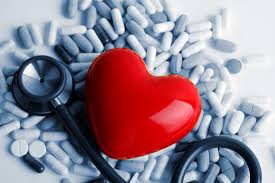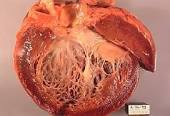
Diagnosed with Cancer? Your two greatest challenges are understanding cancer and understanding possible side effects from chemo and radiation. Knowledge is Power!
Learn about conventional, complementary, and integrative therapies.
Dealing with treatment side effects? Learn about evidence-based therapies to alleviate your symptoms.
Click the orange button to the right to learn more.
- You are here:
- Home »
- Blog »
- side effects ID and prevention »
- Chemotherapy-induced Heart Failure- Rehab?
Chemotherapy-induced Heart Failure- Rehab?

I was diagnosed with chemotherapy-induced cardiomyopathy aka heart failure (HF) in late 2010. I had undergone anthracycline, cytoxan and melphalan chemotherapy as part of my conventional multiple myeloma treatment in late 1995. Chronic atrial fibrillation (AF) sent me to the Cleveland Clinic to see a cardiologist.
A diagnosis of chemotherapy-induced cardiomyopathy taught me that my weakened heart muscle will get weaker and weaker until I reach end-stage. Should I just give up or should I work at cardiac rehabilitation? Am I tilting at windmills if I pursue cardiac rehabilitation?
Antracycline-induced myocardial toxicity- the damage done to the cancer patient’s heart, has been known for years. According to the article linked and excerpted below, as many as 25% of cancer patients who undergo a family of chemotherapy drugs called antracyclines sustain heart damage from their chemo. Many of these patients face early death from this adverse event.
Just because your oncologist prescribes one or more chemotherapy regimens, do not assume that you are not at risk for all possible short, long-term and late stage side effects. While chemotherapy-induced cardiomyopathy/heart failure, is certainly my most serious chemo side effect, it is one of dozens of different side effects.
It is up to you, the patient, to learn about, anticipate and try to prevent your side effects.
All three articles linked and excerpted below cite many chemotherapy regimens as potentially causing heart failure. HF caused by chemotherapy isn’t the issue.
The two issues discussed in this post are:
- Can chemotherapy-induced cardiotoxicity be managed? Can you prevent damaging your heart if you undergo cardio toxic therapy?
- If you do sustain heart failure, can you heal? Can cardiac rehabilitation heal your Chemotherapy-induced cardiomyopathy?
I have to be direct at this point and say that I don’t have definite answers for questions 1 and 2 above. My research into these issues tells me that if you are a cancer patient, your oncologist will tell you not to take antioxidants. If you are a cancer survivor with CIC, the research into cardiac rehabilitation is thin to non-existent as of the writing of this blog post.
All I can go on is my personal cardiac rehabilitation experience.
Since my AF, HF and CIC diagnoses in late 2010, I have researched and followed my own cardiac rehab program. The bad news is that I haven’t healed my CIC. I still live with chronic AF.
The good news is that as of the beginning of 2020, my CIC, AF, BMI, BP, everything I can think of to measure, remains stable. My chemotherapy-induced cardiomyopathy has not gotten any worse since my diagnosis in 2010.
While I would prefer to report that I am in the process of healing, I will take the fact that I’m not getting any worse. My chemotherapy-induced heart damage has stabilized.
Have you been diagnosed with CIC, HF, or any other heart related illnesses? Scroll down the page, post a question or comment and I will reply to you ASAP.
To Learn More about Non-toxic heart therapies- click now
Thank you,
David Emerson
- Cancer Survivor
- Cancer Coach
- Director PeopleBeatingCancer
Recommended Reading:
- Multiple Myeloma Chemotherapy- Heart Damage Increases Over Time
- Heart Failure + Surgery = Higher Risk of Death
Cardiotoxicity of cancer chemotherapy: identification, prevention and treatment
“Cardiotoxicity is an important complication of several cancer therapeutic agents. Several well established and newer anticancer therapies such as anthracyclines, trastuzumab and other HER2 receptor blockers, antimetabolites, alkylating agents, tyrosine kinase inhibitors (TKIs), angiogenesis inhibitors, and checkpoint inhibitors are associated with significant cardiotoxicity…”
The role of antioxidants in the era of cardio-oncology
“Conclusions- Recent success of cancer chemotherapy with combination therapy has raised the old argument on whether cancer patients should receive dietary and/or pharmacologic antioxidants. Whether antioxidants adversely affect the cancer cell killing function of chemotherapeutic agents while exerting cardioprotective effects in humans remain unclear. A critical question that still remains is if patients who have completed chemotherapy should receive antioxidants. The answer to this question will remain unknown until well-designed randomized clinical trials are conducted.
Very early marker of cardiac damage triggered by cancer treatment
“Researchers have identified a very early marker of cardiac damage in patients undergoing therapy with anthracyclines, a family of drugs commonly used to treat cancer. This finding will enable the early diagnosis of the cardiotoxicity associated with this group of widely used chemotherapy drugs…
Advances in cancer treatment sometimes come at the cost of major adverse effects, and one of the most prominent is cardiotoxicity. Myocardial toxicity affects as many as 25% of patients undergoing treatment with commonly used anticancer drugs. The effects of this damage can be severe, condemning the cancer survivor to chronic heart disease and even causing premature death….
As Dr. Ibañez explained, the results have important implications for therapy because the detection this drug-induced damage at very early stages will permit “the implementation of treatments to prevent further deterioration in heart function and a clinical management more closely adapted to the needs of each patient.” The identified marker is affected much earlier than any of the markers used in current clinical practice.
...and thus identify indicators of damage much earlier than changes in any of the markers used in current clinical practice. Philips scientist Dr. Javier Sánchez-González, joint leader of the study, explained that in this way, “we found that the first parameter to show any alteration is T2 mapping, which indicates the presence of edema — an accumulation of water-, and this finding was later confirmed by histological studies…”
The results of the JACC study may help to prevent the severe secondary effects experienced by cancer patients receiving chemotherapy. Moreover, the study may also open the way to new therapies based on mitochondrial transplantation. “This is an innovative and radical treatment proposed in the MATRIX project; patients will be transplanted with their own healthy mitochondria to replace those damaged by the cancer therapy. This approach has not been tried before and would represent a paradigm shift in the treatment of cardiac disease.”


